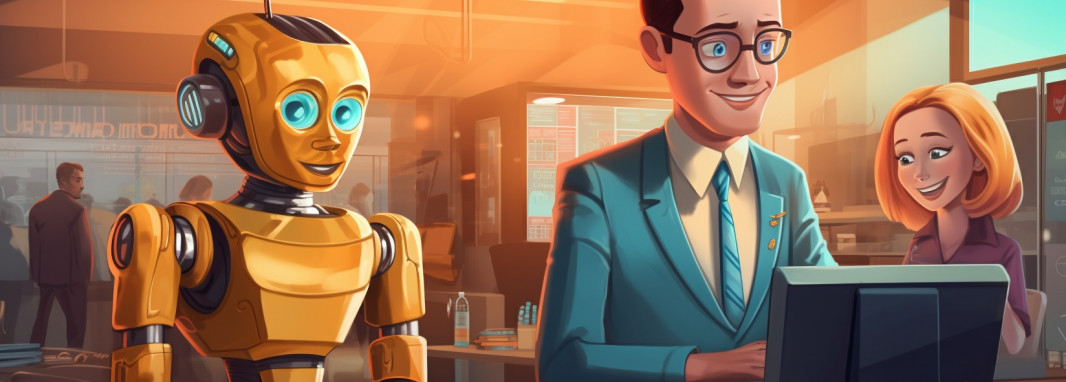The age of Artificial Intelligence (AI) is upon us, transforming sectors from marketing to manufacturing. Amidst these transformations, customer service has experienced one of the most significant evolutions, thanks to innovations like ChatGPT.
So, if you've ever wondered how to harness the powers of chatbots like ChatGPT for customer service, you're in the right place. Drawing from comprehensive research, this article shines a light on the best practices, strengths, and use cases of chatgpt for customer support.
Introducing ChatGPT: The Next Generation Customer Service Chatbot
Before diving into the intricacies of using ChatGPT for customer service, let's understand what it is. ChatGPT, an offspring of the GPT-3 language model, isn't just another chatbot.
It's an open-source AI-driven tool designed to understand and generate human-like text. Since its release, ChatGPT has garnered attention since its release for its versatility and adaptability, enabling businesses from diverse domains to enhance customer interactions.
The Strengths of ChatGPT for Customer Support:
- Multi-functional Utility: ChatGPT, unlike its predecessors, serves multiple functions. Developers use it for debugging, marketers leverage it for ad copy, and businesses employ it for market research. Customer support can facilitate natural, engaging conversations without relying solely on human agents.
- Answering FAQs Efficiently: By leveraging chatgpt for customer service, businesses can automate responses to frequently asked questions, ensuring rapid and consistent replies.
- Triage & Information Collection: ChatGPT can be used alongside humans to gather user information and channel conversations to the most qualified agents instead of replacing the human touch. This method streamlines the initial stages of customer support.
- 24/7 Support: In today's global market, customer inquiries can occur anytime. ChatGPT ensures that support is available round the clock, catering to queries outside typical business hours.
- Multilingual Capabilities: ChatGPT's multilingual support makes it easier for businesses to cater to a worldwide audience. This chatgpt customer service chatbot can converse in multiple languages, bridging the communication gap.
- Assisting Agents: ChatGPT isn't just for customers; it's also a valuable tool for agents. They can use it to generate quick responses, significantly reducing response times, a top priority for many customers.
- Onboarding & Training: New hires can be introduced to ChatGPT to get answers without diving deep into lengthy manuals. This approach shortens the learning curve and helps agents deliver from day one.
Advantages of Implementing ChatGPT in Customer Support:
- Reduced First Response Time: One of the primary advantages of chatgpt for customer support is its ability to decrease the first response time, enhancing user satisfaction.
- Conversation Prioritization: ChatGPT can aid in the triage of incoming requests, categorizing and prioritizing them and ensuring that urgent matters are addressed promptly.
- Personalized Experiences: ChatGPT remembers past interactions, making return customer support experiences smoother. Recalling previous chats can offer relevant suggestions, thus enhancing customer trust.
- Cost-Efficiency: As businesses scale, the volume of inquiries can become overwhelming. ChatGPT helps in reducing overhead costs by automating routine tasks, which in turn decreases the need for massive support staff.
However, it's crucial to remember that while ChatGPT is a powerful tool, it's not without limitations. It can sometimes produce incorrect answers, may struggle with complex issues, and lacks human empathy.
Integration also demands a certain level of technical know-how.
Use Cases of ChatGPT for Customer Support:
While its capabilities span a wide range, understanding how different industries leverage ChatGPT can offer a clearer picture of its versatility.
Below, we delve into specific use cases of ChatGPT for customer support in various sectors:
E-commerce
Tracking Orders: One of the most frequent queries in e-commerce is the status of an order.
ChatGPT can seamlessly integrate with a company's order management system, offering real-time updates to customers without human intervention.
Understanding Product Details: With the vast array of products online, customers often have queries about product specifications, sizes, or other details.
ChatGPT can provide instant answers, pulling data directly from product listings.
Addressing Return Queries: Returns and exchanges can be a complex process, but with ChatGPT, customers can be guided step by step, understanding return policies and even initiating the return process.
Banking
Account Inquiries: From checking account balances to fetching transaction histories, ChatGPT can securely provide customers with their account details, ensuring data privacy and quick response.
Demystifying Banking Processes: Whether it's understanding how to apply for a new credit card, the intricacies of a loan, or setting up a new account, ChatGPT can break down these processes for customers, offering them a clear path forward.
Healthcare
Appointment Guidance: Navigating healthcare appointments can be tricky.
ChatGPT can simplify this by guiding patients on available slots and specialists and even providing reminders for upcoming appointments.
Explaining Medical Procedures: Patients often have apprehensions and queries about medical procedures.
ChatGPT can offer concise explanations, precautions, and post-procedure care details, ensuring patients are well-informed.
Education
Course Information: With a multitude of courses available, students might have questions regarding curriculum, duration, or prerequisites.
ChatGPT can furnish detailed information on these aspects, aiding in the decision-making process.
Enrollment Processes: Navigating the enrollment or admission procedures can be daunting.
ChatGPT can offer a step-by-step guide, from form fill-up to documentation, ensuring students face no hurdles.
General Institutional Information: Whether it's about campus facilities, faculty details, or upcoming events, ChatGPT serves as an information hub, keeping students and parents in the loop.
The Future of AI in Customer Service
- Emotion recognition: As AI technology continues to progress, we will likely see AI chatbots that are able to recognize emotions in text. This would allow chatbots to provide more empathetic and personalized responses to customer queries.
For example, a chatbot could detect that a customer is feeling frustrated and offer them a more gentle or reassuring response.
- Seamless integration: AI chatbots are already being used to automate many customer service tasks, such as answering FAQs and supporting common issues. In the future, we can expect to see AI chatbots become even more integrated with other customer service tools and databases.
This would allow chatbots to access real-time data and provide more comprehensive and accurate responses to customer questions. For example, a chatbot could access a customer's purchase history and recommend products that they might be interested in.
- Thoughtful application of technology: While AI has the potential to revolutionize customer service, it is important for businesses to use it thoughtfully. This means training chatbots on a company's specific data and requirements, monitoring their performance closely, and incorporating customer feedback into their development.
Businesses can ensure that AI chatbots provide a positive customer experience by taking these steps.
Conclusion
As the digital era ushers in revolutionary tools like ChatGPT, the potential to redefine customer service becomes increasingly evident.
With its unparalleled ability to generate human-like conversations, ChatGPT stands at the forefront of AI-driven customer interactions, bridging gaps and offering enhanced experiences.
Through diverse use cases, from e-commerce to education, the versatile applications of ChatGPT in providing timely, relevant, and personalized responses are evident.
However, as with all technology, its power is in its application. For businesses, this means ensuring a symbiotic relationship between AI and human agents, capitalizing on the strengths of each.
As AI advances with features like emotion recognition and even more seamless integrations, thoughtful deployment, rigorous training, and continuous feedback integration become paramount.
Ultimately, the goal isn't just automation but augmentation—amplifying the human touch with the efficiency of AI, crafting a future where customer service transcends current limitations to offer unprecedented levels of satisfaction and engagement.






